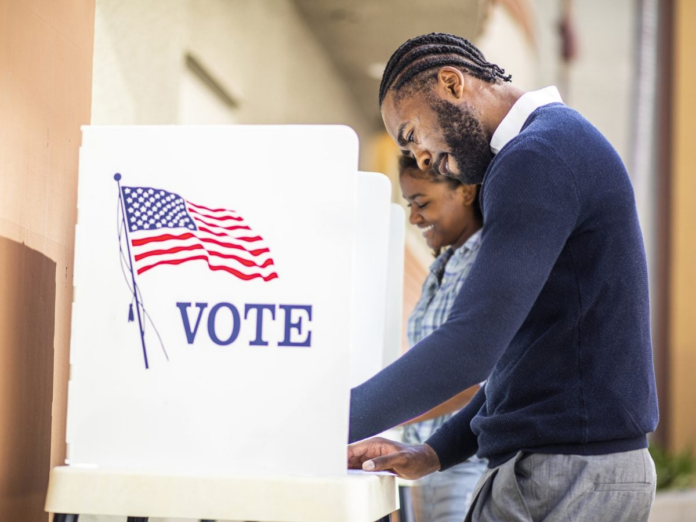A millennial black man and woman voting at a voting booth in an election.
Before you head to the polls today, understand this: that ballot you’re casting today? It’s not just a piece of paper — it’s a financial power move that impacts everything from your morning coffee run (and even that pilates membership) to your retirement account.
While politicians love to throw around big terms like “economic policy” and “fiscal responsibility,” what they’re really talking about is your money – your salary, your savings, your rent or mortgage, and yes, even that side hustle you’ve been growing.
The numbers tell a story we know all too well: Black women still earn just 69 cents for every dollar paid to white, non-Hispanic men, according to the National Women’s Law Center. And when we look at business ownership, despite being the fastest-growing group of entrepreneurs in America, we’re still only receiving less than 1% of venture capital funding. These aren’t just statistics – they’re roadblocks to our financial freedom that can be dismantled through strategic voting.
The housing crisis we can’t ignore.
When it comes to housing, the reality is stark. The latest data from the National Association of Realtors shows that in major cities like Houston, Charlotte, and Atlanta, housing costs have increased by an average of 45% over the past three years, while wages have only grown by 12%. Your local representatives’ decisions on everything from rent control to first-time homebuyer programs directly impact whether you’re building equity or watching your rent money disappear each month.
The funding gap.
For entrepreneurs, the stakes are even higher. Black women-owned businesses are rejected for loans at twice the rate of their counterparts, with 61% of Black women entrepreneurs having to rely on personal funds to start their businesses. Only 3% receive bank loans in their first year. The officials you elect will determine who gets access to small business grants, how contract bidding processes work, and what kind of support systems exist for new business owners.
Equal pay is still not equal.
In the workplace, the Economic Policy Institute’s research paints a clear picture: Black women lose an average of $964,400 over a 40-year career due to the wage gap. States with stronger equal pay laws show up to 30% smaller wage gaps, and unionized Black women earn 26% more than their non-unionized peers. Your vote directly influences equal pay enforcement, workplace discrimination policies, and paid family leave – all crucial factors in closing these persistent gaps.
The healthcare cost burden.
Healthcare costs continue to burden our community disproportionately. Black women pay an average of $21,306 higher in lifetime healthcare costs due to chronic condition disparities. States that expanded Medicaid saw a 45% reduction in medical debt among Black households. Yet out-of-pocket healthcare costs still consume 23% more of Black women’s income compared to the national average.
Building wealth against all odds.
The path to generational wealth faces serious obstacles. The Brookings Institution’s latest analysis shows the median Black family owns just $24,100 in wealth compared to $188,200 for white families. Student loan debt affects 48% of Black women compared to 28% of white women, and our retirement savings are 60% lower than the national average. These disparities aren’t accidents – they’re the result of policies that can be changed through the power of your vote.
When you step into that voting booth, you’re making decisions about who controls business grant programs, who determines healthcare spending, and who shapes policies affecting your ability to build wealth. Look at candidates’ track records on financial regulation, tax policy, and educational funding. Consider their stances on equal pay legislation, small business support programs, and housing affordability measures.
Remember, your vote isn’t just about politics – it’s about protecting and growing your money. In a system where economic policies can either break down or build up wealth barriers, your ballot is your voice for financial change. Today, make that voice count.




